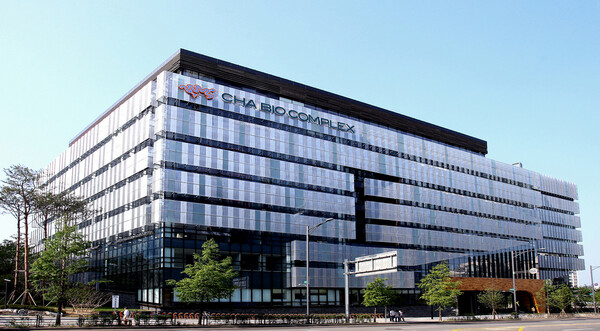CHA Biotech announced on Wednesday that its consolidated revenue reached 603 billion won ($437 million) in the first half, a 21 percent increase from the same period last year, marking the highest half-yearly performance in its history.

The company attributed the growth to the expansion of its global network, including in Australia and Singapore, as well as the inclusion of Singapore in its consolidated financial statements.
The operating loss, based on consolidated financial statements, was 33.3 billion won.
The company ascribed it to aggressive R&D investment expansion by CHA Biotech and its subsidiaries, temporary costs related to distribution structure improvements at subsidiary CMG Pharma, and the advance recognition of costs related to the QAF (Quality Assurance Fee Program) due to fluctuations in the U.S. government’s healthcare budget subsidies.
The net loss on a consolidated financial statement basis was 102.2 billion won, with most of the increase attributed to non-cash expenses, such as foreign exchange evaluation losses recognized at each fiscal year-end, fair value assessments of securities issued by CHA Biotech and its subsidiaries, and accounting interest, which do not involve actual cash outflows.
These costs may vary, depending on future stock prices and exchange rates, according to CHA Biotech.
In standalone financial statements, revenue was 30.3 billion won, and operating loss was 2.3 billion won. Core bio business segments, including genome analysis, immune cell and stem cell storage, and CDMO (contract development and manufacturing organization) services for cells, grew steadily, resulting in a 16 percent increase in revenue compared to the same period last year.
The operating loss expanded year on year due to factors such as the expansion of the new drug pipeline and the securing of core personnel to strengthen R&D capabilities. Under separate financial statements, the net loss for the period was 27.2 billion won. The primary factors contributing to the increase in losses were accounting costs related to the fair value assessment of issued securities and accounting interest, which do not involve actual cash outflows.
The CHA Future Medicine Research Institute (CHARI) of CHA Medical Center and CHA Bio Group is supporting CHA Biotech by establishing a full-cycle R&D system that covers basic research to clinical development of cell therapy products, utilizing 200 R&D personnel, including 20 executive-level researchers.
To this end, the company has recently recruited global R&D experts in stem cell-related fields from leading domestic and international pharmaceutical and biotechnology companies, as well as universities and research institutes, including Pfizer, AstraZeneca, Scripps Research Institute, and Harvard Medical School, to strengthen its research and development capabilities.
CHA Biotech is actively developing cell therapies for intractable diseases, including cancer, Parkinson's disease, and aging, using K-cell lines that can be exported worldwide. The company has more than 20 pipelines and plans to conduct large-scale clinical trials and technology transfers.
CHA Biotech's CGT CDMO business is also progressing smoothly, according to the company.
Its U.S. subsidiary, Matica Biotech, secured orders worth 10 billion won from 10 local biotech companies in the U.S. last year. Additionally, “CGB (Cell Gene Biobank),” which combines CHA Biotech's cell technology and Matica Biotech's CGT CDMO capabilities, is scheduled for completion by December this year, it added.
Related articles
- CHA Biotech wins $150,000 in G-Rex Grant Program
- CHA Biotech builds hub for global cell and gene therapy startups in Pangyo
- CHA Vaccine Institute confirms shingles vaccine safety at higher doses
- CHA Vaccine’s hepatitis B shot triggers T cell response but misses primary endpoint in phase 2b
- CHA Biotech's TIL cell therapy CHATIL selected for KDDF support project
- CHA Biotech’s stem cell therapy triggers menstruation return in phase 1
- Matica Biotechnology partners with Texas A&M University’s NCTM to advance cell and gene therapy development
- CHA Biotech partners with Sartorius to build Korea’s 1st large-scale stem cell production platform
- CHA Biotech signs MOU with Miltenyi Biotec Korea to advance large-scale CAR-NK cell therapy production
- Cha Won-tae named vice chairman of CHA Bio Group and CSO of CHA Biotech
- Matica Biolabs signs CDMO contract with SiALBIO for Sjögren’s syndrome therapy
- CHA Bio Group to take control of Kakao Healthcare in ₩100 bil. deal

